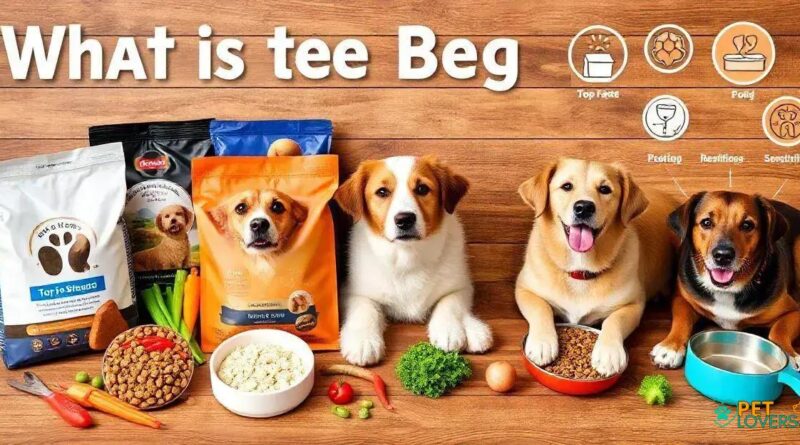What is the Best Dog Food? Discover the Top-Rated Options for Your Furry Friend!
Choosing the right dog food based on your pet’s life stage is vital for their health. Consider their nutritional needs, any food sensitivities, and the best options for their breed and size. Transition to new food gradually to ensure a smooth adjustment, helping your dog receive the essential nutrients they need to thrive.
Are you tired of guessing what is the best dog food for your furry friend? With so many options available, it can be overwhelming to choose the right one.
The key to your dog’s health and happiness lies in a well-balanced diet that meets their unique needs.
In this post, we’ll explore the top-rated dog foods and provide you with a comprehensive guide to help you make an informed decision.
Choosing the Right Dog Food for Your Pet’s Life Stage
As dogs grow and develop, their nutritional needs change. Puppies require more protein and calories than adult dogs, while senior dogs may need joint support and reduced fat. Choosing the right dog food for your pet’s life stage is crucial for their overall health and well-being.
Whether your dog is a playful pup or a gentle senior, selecting a food that meets their unique needs is vital. Learn how to identify the best dog food for your pet’s life stage and ensure they receive the nutrients they need to thrive.
The Importance of Nutritional Balance in Dog Food
A well-balanced diet is essential for dogs, providing them with the necessary nutrients for optimal health and functioning.
Dog food that lacks balance can lead to a range of health issues, from digestive problems to skin allergies.
When selecting a dog food, look for a combination of protein, fat, carbohydrates, vitamins, and minerals that meet your dog’s specific needs.
A balanced diet can help support your dog’s overall health, from their coat and skin to their joints and digestive system.
Learn more about the importance of nutritional balance in dog food and how to choose a food that meets your dog’s needs.
Dogs with Food Sensitivities: What to Look for in a Food
Dogs with food sensitivities require a special diet that takes into account their unique needs.
Common signs of food sensitivities include itching, scratching, and digestive issues.
When selecting a food for a dog with food sensitivities, look for options that use novel protein sources, such as venison or duck, and whole grains.
Avoid foods that contain common allergens like beef, dairy, and soy.
Instead, opt for foods that use alternative ingredients like sweet potatoes and green peas.
Consult with your veterinarian to determine the best diet for your dog and to rule out other underlying health issues.
Best Dog Food Options for Different Breeds and Sizes
Dogs come in all shapes and sizes, and so do their nutritional needs. Small breeds, such as Chihuahuas and Poodles, require a different diet than larger breeds, like Labradors and German Shepherds. Toy breeds, like Pugs and Shih Tzus, need a diet that is high in calories and protein to support their small stature.
Giant breeds, like Great Danes and Mastiffs, require a diet that is high in joint support and calorie management. When selecting a dog food for your pet, consider their breed, size, and age to ensure you’re providing the best nutrition for their unique needs.
Look for foods that are specifically formulated for your dog’s life stage and size, and consult with your veterinarian to determine the best diet for your pet.
Tips for Transitioning to a New Dog Food
Transitioning your dog to a new food can be a daunting task, but with the right approach, it can be a smooth process.
To ensure a successful transition, start by gradually introducing the new food into your dog’s diet, mixing it with their current food in small increments.
Monitor your dog’s behavior and stool quality, and adjust the ratio of new to old food as needed.
It’s also important to choose a food that is similar in texture and flavor to your dog’s current food to minimize the risk of digestive upset.
If your dog experiences any adverse reactions, consult with your veterinarian for guidance and support.
With patience and persistence, your dog can thrive on their new diet.
In Conclusion
Choosing the right dog food for your pet’s life stage is a crucial decision that requires careful consideration of their nutritional needs.
By understanding the importance of nutritional balance in dog food, identifying the best options for dogs with food sensitivities, and selecting a food that meets their unique breed and size needs, you can ensure your dog is receiving the nutrients they need to thrive.
Additionally, transitioning to a new dog food can be a smooth process with the right approach.
By following these tips and consulting with your veterinarian, you can make informed decisions about your dog’s diet and provide them with a healthy and happy life.
FAQ – Frequently Asked Questions about Choosing the Right Dog Food
What is the most important thing to consider when choosing a dog food?
The most important thing to consider when choosing a dog food is your dog’s life stage and nutritional needs. Different dog foods are formulated for different life stages, such as puppyhood, adulthood, and seniorhood, and your dog may require a specific balance of nutrients depending on their age and activity level.
How do I know if my dog has food sensitivities?
If your dog is experiencing digestive issues, skin problems, or other health issues, they may have food sensitivities. Consult with your veterinarian to rule out other underlying health issues and determine the best course of action.
What are some common signs of nutritional imbalance in dogs?
Common signs of nutritional imbalance in dogs include digestive issues, skin problems, and behavioral changes. Consult with your veterinarian to determine the best course of action.
Can I switch my dog to a new food without causing digestive upset?
Yes, you can switch your dog to a new food without causing digestive upset by gradually introducing the new food into their diet. Start by mixing a small amount of the new food with their current food and gradually increase the proportion of new food over several days.
How do I know if my dog is getting the nutrients they need?
Consult with your veterinarian to determine the best diet for your dog based on their life stage, breed, and activity level. Your veterinarian can help you choose a high-quality dog food that meets your dog’s nutritional needs.
What are some common myths about dog food?
Some common myths about dog food include the idea that dogs are omnivores and can thrive on a diet of table scraps, or that dogs can survive on a diet of cheap, fillers. In reality, dogs are carnivores and require a diet that is high in protein and low in carbohydrates.




